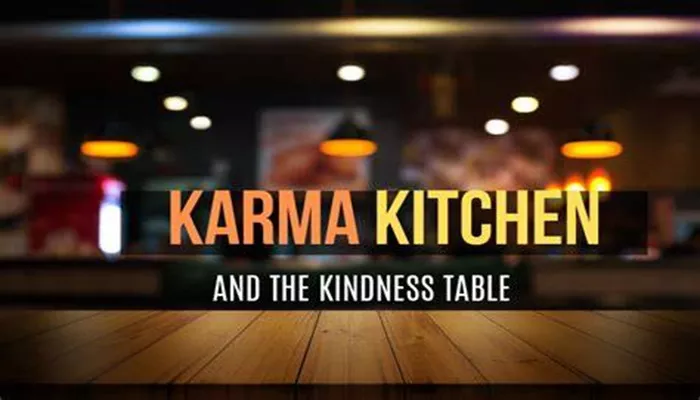Karma’s Kitchen is a revolutionary concept in the food industry, providing innovative solutions for food entrepreneurs through rentable kitchen spaces. The company operates a network of commercial kitchens designed specifically for food production and delivery. These kitchens are equipped with state-of-the-art facilities, allowing businesses to focus on creating quality food without the burden of managing a traditional restaurant space. Karma’s Kitchen aims to provide an environment that fosters creativity and efficiency, making it easier for chefs and food entrepreneurs to thrive.
Karma’s Kitchen Brand Introduction
Karma’s Kitchen is a UK-based startup founded by sisters Eccie and Gini Newton. The brand emerged from their personal struggles to find suitable kitchen space for their catering business, Karma Cans. They recognized a significant gap in the market for flexible and affordable kitchen rentals that cater to food entrepreneurs and businesses looking to adapt to the growing demand for food delivery services.
Key Features of Karma’s Kitchen:
Flexible Rental Options: Karma’s Kitchen offers various rental options, from shared workspaces to private kitchens.
Affordable Costs: The rental costs are significantly lower than traditional restaurant leases.
Supportive Environment: The kitchens are designed to foster collaboration among tenants.
Sustainability Focus: Karma’s Kitchen emphasizes eco-friendly practices, including renewable energy use and waste reduction.
Karma’s Kitchen Franchise Cost
Investing in a Karma’s Kitchen franchise can be an attractive option for aspiring food entrepreneurs. The costs associated with starting a franchise can vary based on several factors, including location and the specific kitchen space chosen.
Initial Investment Breakdown:
Franchise Fee: The initial franchise fee typically ranges from £5,000 to £10,000 ($6,000 to $12,000), depending on the location and size of the kitchen.
Kitchen Rental Costs: Monthly rental costs can start as low as £275 ($340) for shared spaces and go up to £2,600 ($3,300) for private kitchens with specific equipment.
Utilities and Maintenance: Most rental agreements include utilities such as electricity and water. However, additional fees may apply for maintenance or extra services.
Equipment Costs: Depending on the type of kitchen rented (shared vs. private), some tenants may need to invest in their own cooking equipment or supplies.
Marketing and Branding: New franchisees should also budget for marketing expenses to promote their business effectively.
Estimated Total Initial Investment:
Considering all costs, the total initial investment for starting a franchise with Karma’s Kitchen can range from approximately £10,000 ($12,000) to £50,000 ($60,000), depending on the scale of operations and specific requirements.
Karma’s Kitchen Franchise Conditions
To become a franchisee with Karma’s Kitchen, applicants must meet certain conditions that ensure they align with the brand’s values and operational standards.
Eligibility Requirements:
Business Experience: While prior experience in the food industry is beneficial, it is not mandatory. However, potential franchisees should have some business acumen or management experience.
Financial Stability: Applicants must demonstrate financial stability to cover initial investments and ongoing operational costs.
Commitment to Quality: Franchisees must adhere to Karma’s Kitchen standards regarding food quality and safety.
Sustainability Practices: Franchisees are encouraged to adopt eco-friendly practices in their operations.
Karma’s Kitchen Franchise Process
The process of becoming a franchisee with Karma’s Kitchen is straightforward but requires careful planning and commitment.
Step-by-Step Process:
Initial Inquiry:
Interested individuals can start by visiting the Karma’s Kitchen website or contacting their franchise team for more information about opportunities.
Application Submission:
Complete an application form detailing your business experience, financial background, and proposed business model within Karma’s Kitchen.
Franchise Disclosure Document (FDD):
Upon acceptance of your application, you will receive an FDD that outlines all necessary information about the franchise agreement, costs involved, and operational guidelines.
Interview Process:
Participate in an interview with the founders or franchise team to discuss your vision for your business within Karma’s Kitchen.
Site Selection:
Work with the team at Karma’s Kitchen to select an appropriate kitchen location based on your business needs.
Signing the Agreement:
Once both parties agree on terms and conditions, you will sign the franchise agreement.
Training Program:
Attend a comprehensive training program provided by Karma’s Kitchen that covers operational procedures, marketing strategies, and best practices in running your kitchen space effectively.
Launch Your Business:
After completing training and setting up your kitchen space according to brand standards, you can officially launch your business!
Karma’s Kitchen Franchise Profit
The profit potential for franchisees operating within Karma’s Kitchen can be substantial due to several factors that contribute to revenue generation.
Revenue Streams:
Food Sales:
The primary source of income will come from selling prepared meals through delivery platforms like Uber Eats or Deliveroo.
Catering Services:
Offering catering services for events can provide additional revenue streams beyond regular meal sales.
Collaborative Ventures:
Sharing kitchen space allows for collaboration with other food businesses which can lead to joint promotions or events that drive sales.
Brand Partnerships:
By partnering with established brands or local businesses, franchisees can enhance their visibility and customer base.
Profit Margins
Typical profit margins in the food industry range from 10% to 20%, depending on various factors such as location, pricing strategy, and operational efficiency.
By leveraging the lower overhead costs associated with renting kitchen space rather than managing a full restaurant operation, many franchisees find that their profit margins can be significantly higher compared to traditional restaurant models.
Conclusion
Karma’s Kitchen presents an innovative solution for aspiring food entrepreneurs looking for flexible kitchen space without the burden of traditional restaurant overheads. With its supportive environment focused on collaboration and sustainability, it offers an attractive option for those wanting to enter the booming food delivery market.
By understanding the brand introduction, costs involved in franchising, eligibility requirements, processes for becoming a franchisee, and profit potential associated with operating within this model—entrepreneurs can make informed decisions about joining this exciting venture in the culinary landscape.
Related topics:
- The Cheesecake Factory Franchise Costs, Profit & Requirements For 2024
- All-Egg-Sandwich Franchise Costs, Profit & Requirements For 2024
- Spur Franchise Costs, Profit & Requirements For 2024

